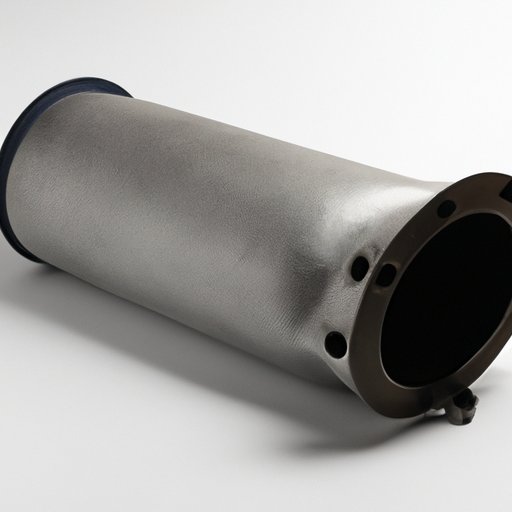Introduction
A catalytic converter is an essential component in the exhaust system of most modern vehicles. It plays a key role in reducing emissions and improving air quality by converting harmful gases into less toxic ones. But what many people don’t know is that this process generates a lot of heat. How hot does a catalytic converter get? This article will explore this question in depth and provide tips for staying safe when working around catalytic converter heat.

A Comprehensive Guide to Catalytic Converter Heat: What to Expect and How to Stay Safe
When it comes to catalytic converter heat, there are a few things you should keep in mind. Firstly, temperature ranges can vary depending on several factors, including the type of vehicle and the environment in which it is operated. Secondly, safety should be your top priority when dealing with catalytic converter heat, as it can cause serious burns if not handled properly. Finally, there are a few prevention tips you should follow to ensure your safety when working around catalytic converter heat.

The Temperature Rises: Understanding the Heat Generated by a Catalytic Converter
There are several factors that influence the temperature of a catalytic converter. The engine’s operating temperature has a major impact, as does the amount of oxygen present in the exhaust. The catalyst material used also plays a role, as some materials are better at dissipating heat than others. Additionally, the size and design of the catalytic converter can affect its temperature, as larger converters tend to run hotter than smaller ones.
High temperatures can have a negative effect on a catalytic converter. Prolonged exposure to excessive heat can cause the converter to break down, resulting in reduced performance and increased emissions. Additionally, the heat generated by a catalytic converter can damage other components in the exhaust system, such as the muffler or exhaust pipes.
It is important to be aware of the warning signs of a malfunctioning catalytic converter. If you notice a decrease in engine performance, an increase in fuel consumption, or an unusual smell coming from the exhaust, these could all be indications that your catalytic converter is overheating.
The Hot Topic: Exploring Just How Hot Does a Catalytic Converter Get?
The average temperature of a catalytic converter can range anywhere from 500°F to 1,000°F. At these temperatures, the catalytic converter is able to effectively convert harmful gases into less toxic ones. However, temperatures can reach much higher levels under certain conditions. For example, if the engine is running at high speeds or if the catalytic converter is clogged, temperatures can easily exceed 1,500°F.
These extreme temperatures can cause significant damage to the catalytic converter, as well as other components in the exhaust system. They can also lead to an increase in emissions, as the catalytic converter is not able to function properly. Additionally, prolonged exposure to high temperatures can cause the catalytic converter to fail completely.
In order to avoid these issues, it is important to be aware of the warning signs of a malfunctioning catalytic converter. If you notice any of the symptoms mentioned above, it is best to take your vehicle to a mechanic as soon as possible.

The Heat is On: Catalytic Converters and Their Impact on Vehicle Performance
It is important to understand how heat affects the performance of a vehicle. High temperatures can cause severe damage to the engine and other components, resulting in decreased performance and increased fuel consumption. Additionally, excessive heat can cause the catalytic converter to overheat, leading to a decrease in efficiency and an increase in emissions.
In order to diagnose a faulty catalytic converter, it is important to look for the warning signs. If you notice a decrease in engine performance, an increase in fuel consumption, or an unusual smell coming from the exhaust, these could all be indications that your catalytic converter is overheating.
If the problem is not addressed quickly, it can lead to further damage and increased repair costs. Therefore, it is important to take your vehicle to a mechanic as soon as possible if you suspect a malfunctioning catalytic converter.
Overheating Alert: What You Need to Know About Catalytic Converter Heat
It is important to be aware of the potential dangers of excessive heat buildup in a catalytic converter. High temperatures can cause severe damage to the converter and other components in the exhaust system, resulting in decreased performance and increased emissions. Additionally, prolonged exposure to high temperatures can cause the catalytic converter to fail completely.
In order to prevent excessive heat buildup, it is important to keep an eye on the warning signs of a malfunctioning catalytic converter. If you notice any of the symptoms mentioned above, it is best to take your vehicle to a mechanic as soon as possible. Additionally, regular maintenance can help keep the catalytic converter functioning properly and reduce the risk of overheating.
If the problem is not addressed quickly, it can lead to further damage and increased repair costs. Therefore, it is important to take your vehicle to a mechanic as soon as possible if you suspect a malfunctioning catalytic converter.
In addition, there are several solutions available for fixing a damaged catalytic converter. Depending on the severity of the issue, a mechanic may be able to repair or replace the converter. In some cases, the entire exhaust system may need to be replaced.
Conclusion
This article has explored the topic of catalytic converter heat in depth. We have discussed the temperature ranges of catalytic converter heat, the safety concerns associated with it, and the prevention tips for staying safe while working around it. We have also looked at the factors that influence catalytic converter temperature, the effects of high temperatures on catalytic converters, and the warning signs of catalytic converter overheating. Finally, we have explored the average and maximum temperatures of catalytic converters, the causes of extreme temperatures in catalytic converters, and the impact of heat on vehicle performance.
Overall, it is important to be aware of the potential dangers of excessive heat buildup in a catalytic converter. High temperatures can cause severe damage to the converter and other components in the exhaust system, resulting in decreased performance and increased emissions. Additionally, prolonged exposure to high temperatures can cause the catalytic converter to fail completely. Therefore, it is important to take your vehicle to a mechanic as soon as possible if you suspect a malfunctioning catalytic converter.
By following the prevention tips outlined in this article, you can help ensure your safety when working around catalytic converter heat. With the right knowledge and precautions, you can protect yourself and your vehicle from the potentially dangerous effects of excessive heat.
(Note: Is this article not meeting your expectations? Do you have knowledge or insights to share? Unlock new opportunities and expand your reach by joining our authors team. Click Registration to join us and share your expertise with our readers.)
